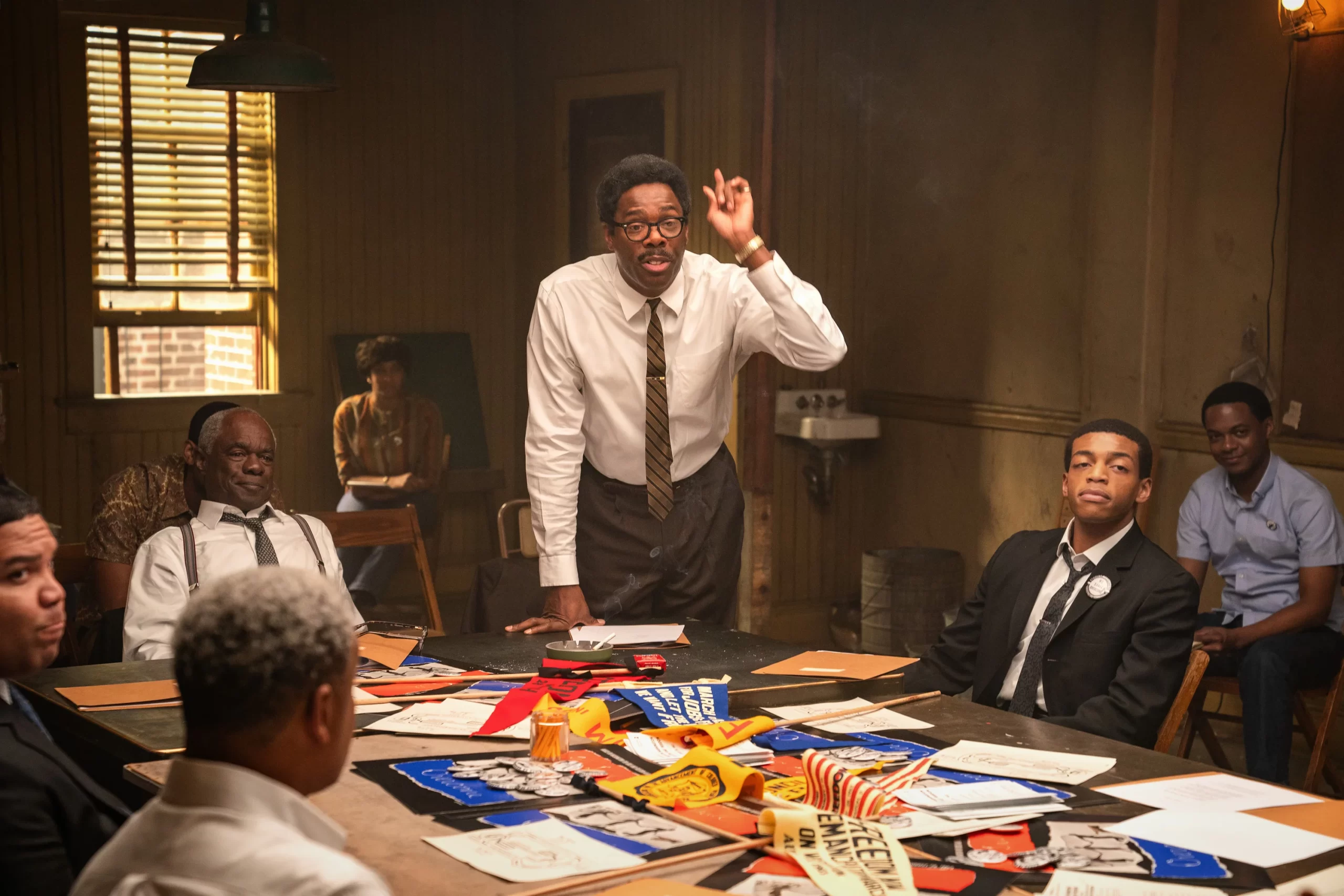
As protests rage on around the world, the how of these massive demonstrations is often forgotten or glossed over. Who organizes these protests? How are thousands of people corralled into one place fighting for one cause? Rustin reintroduces the world to political organizer Bayard Rustin (Colman Domingo), who was a close advisor to Dr. Martin Luther King Jr. (Aml Ameen), who has dedicated his life to the quest for racial equality, human rights and worldwide democracy. In the 1950s however, he is exiled from the burgeoning Civil Rights Movement due to his living as a semi openly gay Black man, when Congressman Adam Clayton Powell (Jeffrey Wright) threatens to spread a rumor that he and Dr. King are more than friends if they don’t stop a planned march in Los Angeles. After spending years outside the movement, Bayard attempts to make his comeback by planning his most ambitious event yet, a march on the National Mall in Washington, D.C.
Rustin starts off with a bang with an opening montage of pivotal civil rights moments and iconic images from a recreation of Ruby Bridges’ famous escort to desegregate William Franz Elementary School in New Orleans that was immortalized by Norman Rockwell to the Little Rock Nine Scream image featuring Elizabeth Eckford, setting the stage for its depiction of the emotional labor that goes into the physical labor of organizing mass protests. The film is produced by former President Barack Obama and former First Lady Michelle Obama’s company Higher Ground and it becomes clear that Rustin was made to serve as a how-to manual from the former community organizer on how to effectively advocate. President Obama has been vocal regarding modern protest movements and how he thinks they can be focused in order to bring about change. This film puts a microscope on how the sausage with a clear message on how successful movements are built not just on blood, sweat, tears, and vigor, but sacrifice and compromise toward a clear goal as well. The young activists often push Bayard and the old guard of the movement to push harder against the powers that be in order to achieve their arms without any concessions. Bayard himself serves as the firebrand line stepper compared to the more tempered old guard in organizations such as the National Urban League, NAACP, and SCLC. Both Bayard and the youngsters must regularly sacrifice their wants in order to meet the movement’s needs and ensure that the entire ship doesn’t go down in service of one specific desire. The back and forth between the factions paints the point about how overarching goals are met and what it takes in order move a gigantic movement forward.
On the flip side, Bayard is often forced to make tough choices and tradeoffs not just on the timeline and logistics of a march, but unfortunately on publicly addressing and acknowledging his wholeness as a person in the face of a culture and moment in time where doing such could derail an entire segment of the populace. Bayard is shown to be as unflinching and uncompromising as the times allow him, but willing to adjust and obfuscate when necessary, even at the cost of his own mental health at times. The film makes clear the tumult and unfairness of this trade-off, criticizing those bad political actors who would use subtle blackmail against Bayard to stymie the fight for civil rights and how Bayard is constantly mistreated by the power structure and done a disservice by his fellow activists who often treat him as a problem to weigh rather than an ally to be supported. This emotional thread of the film is strengthened by a virtuoso performance from Domingo as Rustin, where he is mesmerizing and multifaceted as the complicated and flamboyant civil rights figure. Domingo transforms himself into a brilliant yet conflicted and slightly flawed titan of organizing who throws himself into his work in an effort to avoid his own demons. The performance tugs at all the right emotions and pulls the audience in from the onset with charisma and drama.
This plot element also plays into the film’s secondary theme regarding friendship that expands Rustin past just being a retelling of historic events. The friendship between Martin Luther King and Bayard and how it is tested throughout the years due to Bayard’s sexual orientation is integral to the film’s plot and Bayard’s character arc. The two are constantly at odds with one another over Bayard’s proximity to the movement despite his publicly being somewhat closeted. As Bayard and the more incendiary advocates must learn compromise, Martin must learn to be uncompromising in his support of the movement’s master planner despite whatever threats come from his personal life. The tests their friendship undergoes throughout the film is a nice personal touch that compliments the wider story of how the March on Washington was formed, giving it a humanistic touch.
Rustin’s strength as a film is in its motivating story and the powerful performance from its lead Colman Domingo. Both his acting and the depiction of the planning and effort that went into the historic March on Washington created an emotional pull for the audience that is sure to feature maximum engagement from those watching. Domingo is commanding onscreen and undoubtedly offers one of the five best performances of the year for a lead actor. At the screening I attended, it was one of two films I’ve seen this year that garnered audience applause during the film and not just afterward. Director George C. Wolfe has his origins in the theater and structures his films as such, focusing more on story and acting that the dynamic direction of film, but Rustin doesn’t suffer from his lack of dynamism here.
Image: Netflix

